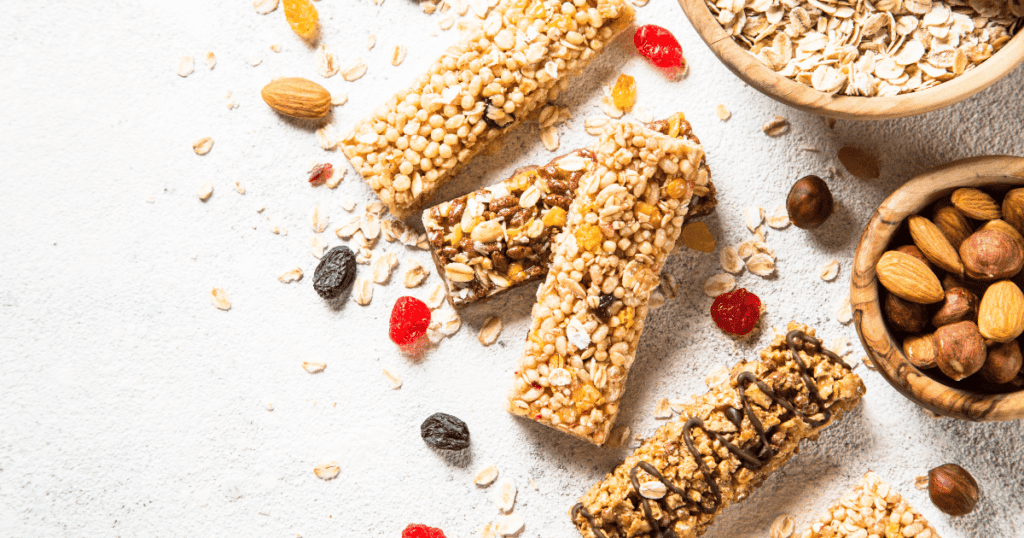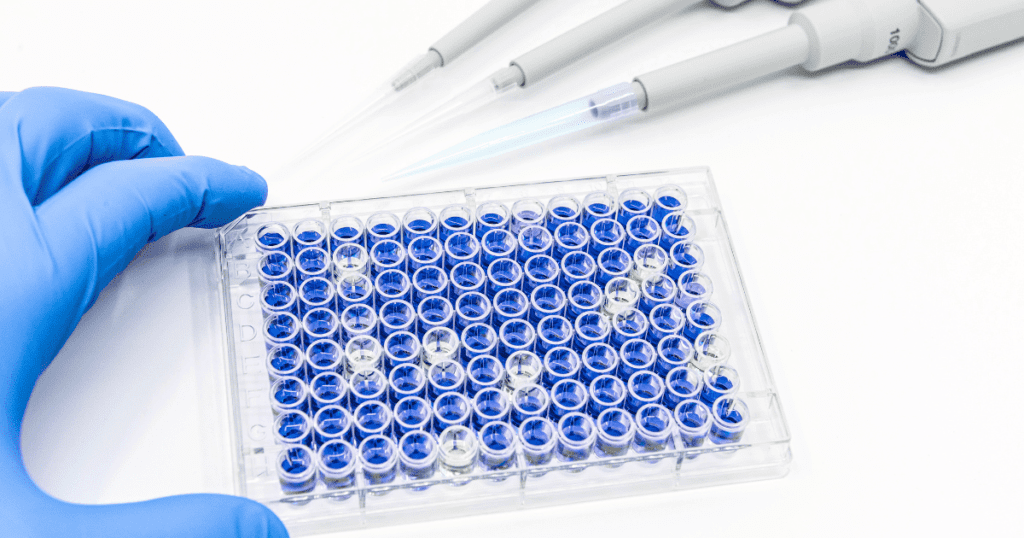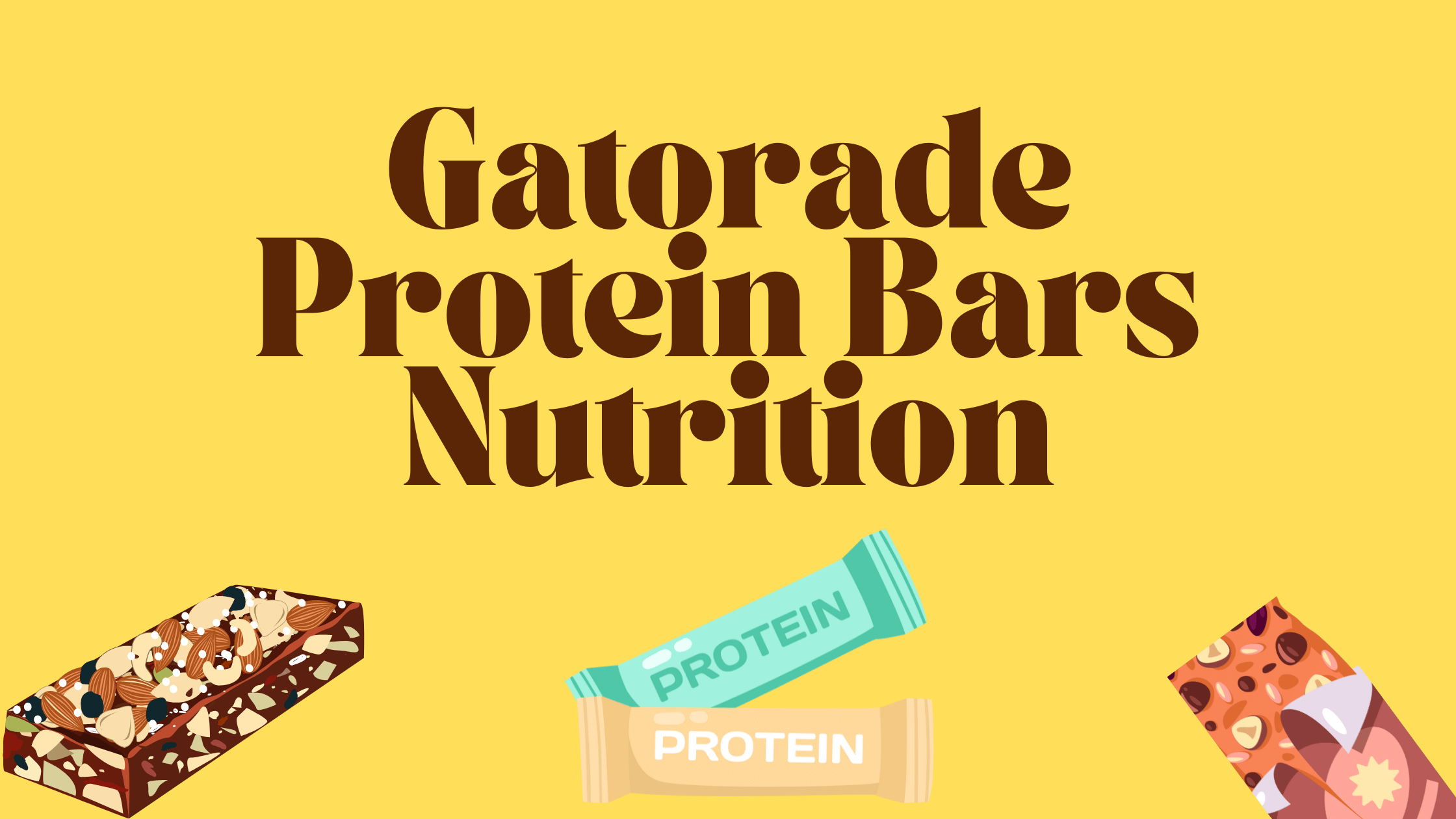Gatorade Protein Bars provide 20 grams of high-quality whey and milk protein. They contain up to 350 calories and 42 grams of carbohydrates per bar.
These protein bars feature adequate nutritional elements to fuel muscle recovery and give athletes an on-the-go option to fulfill their dietary needs. With the perfect blend of macronutrients, Gatorade Protein Bars support an active lifestyle and cater to those seeking a post-workout snack.
These bars come in various flavors, with different vitamins and minerals to support health and performance. As Gatorade is a brand synonymous with sports nutrition, these protein bars integrate seamlessly with a proactive and health-conscious routine, helping to maintain energy levels throughout the day.
That said, this article contains all the nuts and bolts about Gatorade Protein Bars that you need to know. Hence, without delaying more, dive deeper into this content.
Unpacking Gatorade Protein Bars Nutrition
Athletes and fitness enthusiasts favor these on-the-go bars as they support recovery and help boost performance. Let’s look at what these bars contain regarding nutrition and ingredients.
Understanding the Nutritional Value
Gatorade Protein Bars are power-packed with essential nutrients that serve as a quick source of energy and muscle recovery aid. Each bar typically contains around 20 grams of protein, vital for muscle repair and growth.
It’s also loaded with significant carbohydrates and calories to replenish energy. The bars also include varying amounts of dietary fiber, vitamins, and minerals needed for overall wellness.
Identifying Key Ingredients
The core components of a Gatorade Protein Bar are as follows:
- Protein Blend: A combination of milk protein isolate and whey protein concentrate for muscle recovery.
- Carbohydrates: Sourced from cane invert syrup, rice flour, and oats to provide quick energy.
- Fats: Including vegetable oils that deliver essential fatty acids.
- Additional Elements: Vitamin and mineral fortification for enhanced nutritional value alongside flavors and preservatives.
Evaluating Macronutrient Balance
For athletes and active individuals, balancing macronutrients is crucial. Gatorade Protein Bars offer a convenient ratio of proteins, carbs, and fats, engineered for post-workout recovery or as a satisfying snack.
The high protein content helps muscle recovery, while the carbohydrates aid in quick energy restoration. Nevertheless, it is essential to note that these bars contain a notable amount of sugars and fats. Let’s take a look at the table below to understand better.
| Nutrient | Amount per serving |
| Calories | 350 |
| Protein | 20g |
| Carbohydrates | 42g |
| Sugars | 29g |
| Fats | 10g |
Gatorade Protein Bars provide the nutrients necessary for a post-workout meal, but you should consume them while considering your entire nutritional plan.

Gatorade Bars for Athletic Performance
Maximizing athletic output requires more than rigorous training; it demands optimal nutrition. Gatorade Protein Bars are crafted to support athletes’ energy needs and muscle recovery process.
Engulfed with a blend of high-quality protein and carbohydrates, these bars are a convenient on-the-go snack and a strategic tool to enhance athletic performance.
Benefits for Energy and Stamina
Energy and stamina serve as the backbone for athletic success. Gatorade Protein Bars can fuel the body with essential nutrients. Here is how they contribute:
- Immediate Energy: A balance of carbs and sugar provides a quick energy boost to power athletes through intense training sessions.
- Sustained Release: The fiber content ensures a steady release of energy, preventing crashes and sustaining performance.
- Optimal Carbohydrate Blend: Bars contain simple and complex carbohydrates, crucial for endurance and stamina.
Role in Muscle Recovery
Muscle recovery is paramount in any training regimen. Gatorade Protein Bars come packed with protein, vital for muscle repair and growth. Key recovery aspects include:
- Quality Protein: Delivering up to 20 grams of protein per bar to facilitate muscle synthesis.
- Amino Acids: Includes essential amino acids the body cannot produce, aiding recovery.
- Glycogen Replenishment: Carbohydrates in the bars help replenish glycogen stores, which are depleted after exercise.
Timing: Pre- or Post-workout
The timing of Gatorade Protein Bar consumption can influence their effectiveness in enhancing athletic performance:
| Timing | Benefits |
| Pre-Workout | Boosts energy levels for high-intensity training.Preps muscles for the rigorous activity to come. |
| Post-Workout | Supports muscle repair and growth.Speeds up recovery by restoring glycogen. |
Eating a Gatorade Protein Bar about 30 minutes before exercise offers the immediate energy required, and consuming it within 45 minutes after exercise supports effective recovery.
Analyzing Protein Quality

Understanding the protein quality within Gatorade Protein Bars is crucial for athletes and fitness enthusiasts. As you know, protein is the building block of muscles, and the quality of protein consumed directly impacts muscle recovery and growth.
Gatorade Protein Bars offer a convenient source of protein. Still, it’s essential to investigate the types of protein they contain, the difference between complete and incomplete proteins, and the relevance of biological value to gauge their effectiveness.
Let’s break down these bars’ constituents to understand better the protein quality they deliver.
Types of Proteins Used
The types of protein found in Gatorade Protein Bars are a blend designed for optimal recovery and muscle growth. Typically, these include:
- Whey Protein Concentrate: Fast-absorbing protein for quick muscle repair.
- Milk Protein Isolate: Contains both whey and casein for a steady supply of amino acids.
- Soy Protein Isolate: A plant-based protein that complements the amino acid profile of dairy proteins.
Complete Vs. Incomplete Proteins
Proteins comprise amino acids, some of which the body can’t synthesize and must obtain from food. A complete protein contains all nine essential amino acids in the correct ratios. In contrast, an incomplete protein lacks one or more essential amino acids.
Gatorade Protein Bars traditionally incorporate complete proteins, ensuring the body receives the full spectrum of essential amino acids required for effective muscle repair and synthesis.
Protein’s Biological Value
A protein’s biological value (BV) measures how efficiently the body can utilize it. It considers how readily the digested protein can be turned into body tissues.
The higher the BV, the more influential the protein promotes muscle growth and repair. Gatorade Protein Bars typically blend proteins with high BV, such as whey, to maximize the body’s ability to use the protein provided.
| Protein Source | Biological Value |
| Whey Protein | 104 |
| Milk Protein | 91 |
| Soy Protein | 74 |
Overall, Gatorade Protein Bars can replenish energy and provide a high-quality protein source to support the body’s recovery and muscle-building needs.
Nutrient Profile Enhancement
The athletic grind demands intense training and a precise blend of nutrients to aid recovery and performance. Gatorade Protein Bars offers a robust nutrient profile designed to meet the needs of athletes and fitness enthusiasts alike. Let’s explore how these bars have been enhanced with additional nutrients to bolster overall dietary intake.
Added Vitamins and Minerals
Gatorade Protein Bars are fortified with an array of essential vitamins and minerals. These bars provide more than just protein; they serve as a conduit for nutrients that might be otherwise difficult to obtain from protein sources alone. Below is a rundown of these enhancements:
- Vitamin B6 is vital for energy production and proper nervous system functioning.
- Vitamin B12 – Supports red blood cell formation and neurological health.
- Calcium – Essential for bone health and muscular function.
- Iron – Crucial for oxygen transport and energy metabolism.
Comparison with Whole Food Sources
While Gatorade Protein Bars serve as a convenient nutrition source, it’s essential to consider how they stack up against whole foods. Foods like chicken, fish, legumes, and nuts provide protein and are accompanied by numerous beneficial compounds such as fiber, antioxidants, and phytonutrients—less pronounced in processed bars.
| Nutrient | Whole Food Source | Gatorade Protein Bar |
| Protein | Chicken breast, Beans | 20g per bar |
| Fiber | Legumes, nuts | Less than whole foods |
| Antioxidants | Fruits, vegetables | Not a primary source |
Though Gatorade Protein Bars augment the diet with added vitamins and minerals, relying solely on them might not provide the full spectrum of nutrients from varied whole food sources.
For optimal health and performance, it’s essential to maintain a balanced diet that includes a variety of nutrient-dense foods.
Sugar Content and Health Considerations

Understanding the sugar content in products like Gatorade Protein Bars is crucial when delving into sports nutrition. Athletes and fitness enthusiasts often turn to these bars for quick energy and recovery support.
However, the sugar content can significantly impact overall health and wellness. This segment will examine sugar levels and their potential impact on health and explore alternative sweetening methods.
Examining Sugar Levels in Gatorade Bars
Gatorade Protein Bars boast a powerful combination of protein and carbohydrates aimed at refueling tired muscles. But what about sugar content?
Each bar contains significant sugar, contributing to its palatable taste and immediate energy release. For example, some bars have sugar quantities ranging from 20 to 30 grams per bar, which is substantial compared to recommended daily limits.
Impact on Blood Sugar and Health
The high sugar content in these bars can lead to quick spikes in blood sugar levels, providing an instant surge of energy followed by a potential crash.
Over time, excessive sugar intake may contribute to health issues such as weight gain, insulin resistance, and diabetes. Athletes must be mindful of their total daily sugar intake.
- Short-Term Effects: A rapid increase in energy and possible subsequent energy crash.
- Long-Term Effects: Potential risk of chronic health conditions related to consistent, high-sugar diets.
Alternatives for Managing Sweetness
While Gatorade Protein Bars offer convenience and taste, there are ways to manage sweetness without relying exclusively on high sugar content.
Natural sweeteners like stevia or monk fruit extract provide a lower-calorie alternative. Incorporating complex carbohydrates like oats or quinoa can sustain energy levels more effectively. Individuals could also consider DIY protein bars using ingredients such as:
| Ingredient | Benefit |
| Nuts and Seeds | Healthy fats and added protein |
| Dates or Dried Fruit | Natural sweetness with fiber |
| Dark Chocolate Chips | Antioxidants and minimal sugar |
Homemade options offer control over ingredients and help maintain optimal health while supporting athletic performance and recovery.
Gatorade Protein Bars in Diets
Integrating Gatorade Protein Bars into a balanced diet can be an excellent way to fuel your body after workouts or to satisfy your midday hunger pangs. But how do they fit in with your diverse eating habits and protein requirements?
Let’s look at their role in various dietary plans and the importance of combining them with other protein sources for optimal health and performance.
Suitability for Various Dietary Needs
Gatorade Protein Bars cater to those looking for a quick protein boost, especially after intense physical activity. Their high protein content supports muscle recovery and satiates appetite effectively.
However, it’s essential to consider dietary preferences and restrictions when adding them to your regimen. Here’s a breakdown:
- Gluten-Free Diets: Certain varieties of Gatorade Protein Bars are gluten-free, making them a suitable option for individuals with gluten sensitivities or celiac disease.
- Lactose Intolerance: These bars often contain dairy derivatives, which may not align well with those having lactose intolerance.
- Vegan/Vegetarian Diets: Gatorade Protein Bars are not vegan, as they contain dairy and other animal products. Vegetarians might consume them depending on their comfort with dairy products.
- Low-Carb/Keto Diets: Given their carbohydrate content, these bars might not best fit for low-carb or ketogenic diets.
Always review the ingredient list and nutrition facts before incorporating any bar into your diet for specific health concerns or dietary restrictions.
Balancing with Other Protein Sources
While Gatorade Protein Bars offer a convenient source of protein, it’s crucial to maintain dietary balance. Integrating various protein sources ensures a broader range of nutrients for your body.
So, consider the following:
- Animal Proteins: These include meat, poultry, fish, and dairy. They’re complete proteins containing all the essential amino acids.
- Plant-Based Proteins: Items such as legumes, nuts, and seeds are vital for reducing animal product intake.
- Protein Powders: Supplementing with protein powders can be an additional source, particularly for those with higher requirements.
Remember, portion control is vital. A balanced approach includes Gatorade Protein Bars as part of a varied diet rather than the sole protein source. Paying attention to your daily protein intake, including other sources like whole foods, will help promote muscle health and overall well-being.
Aligning Gatorade Protein Bars with Fitness Goals
Fitness enthusiasts and athletes constantly strive to optimize their nutrition to align with their goals. Gatorade Protein Bars can be an excellent addition to their arsenal, offering convenient, high-protein snacking options.
Understanding the nutritional profile of these bars is imperative for effectively incorporating them into a fitness routine. Let’s unpack how to match Gatorade Protein Bars to your fitness objectives, considering caloric content, meal planning, and activity-specific needs.
Caloric Content for Weight Management
Managing caloric intake is crucial when it comes to weight management. Gatorade Protein Bars come with a significant amount of calories, making it essential to consider them within your daily caloric budget.
If integrated correctly, these bars can provide a quick energy boost pre-workout or repair muscle post-exercise without sabotaging weight goals.
| Bar Flavor | Caloric Content |
| Chocolate Chip | 360 calories |
| Chocolate Caramel | 340 calories |
| Peanut Butter | 350 calories |
We recommend you check the flavor’s caloric content, as each can vary. Strategically include bars in moderation if you strive for lean muscle without excess weight gain.
Integrating Bars with Meal Planning
- Timing: Schedule Gatorade Protein Bars around workouts or as a mid-day snack to maintain energy levels.
- Balance: Pair bars with fruits or nuts to create a balanced meal with fiber and healthy fats.
- Substitution: Replace an occasional meal with a protein bar when traditional meals aren’t viable.
An effective meal strategy ensures these high-protein snacks complement a diet rich in whole foods while preventing over-reliance on processed items.
Customizing Intake for Different Activities
Different fitness activities demand specific nutritional approaches. Endurance athletes may benefit from the high carbohydrate content for sustained energy, whereas strength trainers might focus on protein for muscle recovery.
- Eating a bar pre-run can fuel endurance athletes with readily available energy.
- Consuming post-resistance training can aid in the recovery process for strength-focused individuals.
Customize your protein bar intake based on your activity type, intensity, and duration to ensure optimal performance and recovery.
Frequently Asked Questions (FAQs)
What’s in A Gatorade Protein Bar?
Gatorade Protein Bars contain high-quality whey and milk protein blends. They fuel muscles and aid recovery after exercise. Each bar typically includes carbohydrates, fats, protein, fiber, vitamins, and minerals.
How Many Calories in Gatorade Protein Bars?
A typical Gatorade Protein Bar contains about 200-300 calories. It’s ideal for post-workout recovery. The exact calorie count varies by flavor and size.
Are Gatorade Protein Bars Gluten-free?
No, Gatorade Protein Bars aren’t gluten-free. They contain ingredients like wheat, which is a source of gluten. Always read the label for allergens.
Do Gatorade Protein Bars Have Added Sugars?
Yes, Gatorade Protein Bars include added sugars. It’s part of their carbohydrate content. The sugars help replenish energy quickly after physical activities.
The Bottom Line
You now know virtually everything about Gatorade Protein Bars nutrition. These bars offer a convenient nutrition option for athletes and fitness enthusiasts on the go.
With their balanced mix of proteins, carbohydrates, and essential vitamins, these bars support muscle recovery and energy replenishment. Remember, choosing the right snacks can make a big difference in your fitness journey.
Enjoy them as part of a well-rounded diet to fuel your active lifestyle. Stay energized, stay on track.
Source
https://www.gatorade.com/protein/recover-protein-bar/chocolate-chip-bar-10052000104322
https://intermountainhealthcare.org/blogs/how-to-pick-the-right-protein-bar
Disclaimer
This article is written to share general yet reliable information and isn’t a substitute for professional medical advice from qualified healthcare professionals and fitness experts.
- Ricotta Vs Cottage Cheese Nutrition: The Health Showdown! - August 13, 2024
- Rita’s Water Ice Nutrition Facts: Savor Health! - June 11, 2024
- Where Do You Find Nutritional Yeast in Grocery Store – Aisle Secrets! - April 4, 2024




